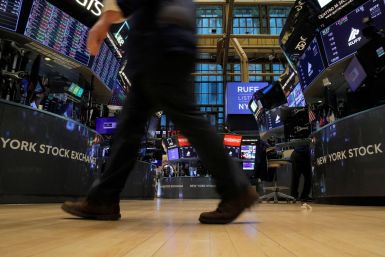Brazil's Economy Ministry is trying to limit the cost of higher cooking gas subsidies and a new cash transfer program for truck drivers, which the government is envisaging as a way to ease the impact of soaring fuel prices in an election year, said five sources familiar with the matter.
The International Monetary Fund said on Wednesday it welcomed an economic reform program announced by the Tunisian government this month and is ready to start negotiations in coming weeks over a loan program.
RedBird Capital Partners is partnering with an outgoing executive from Raymond James Financial Group to establish a new asset and wealth management platform, sources familiar with the matter said on Wednesday.
Chicago Federal Reserve Bank President Charles Evans on Wednesday signaled he would likely back another big interest rate hike in July unless inflation data improves, saying the Fed's top priority is to "take the steam" out of price pressures.
Lebanon's Bank Audi and Al-Mawarid Bank said on Wednesday they disagreed with a letter sent on behalf of the country's banking association that slammed a staff level agreement with the International Monetary Fund as "unlawful".
The top U.S. consumer watchdog on Wednesday said it had begun a review of "excessive" credit card fees and asked card issuers for data on revenue and expenses in a bid to stamp out abuses and boost competition.
The Federal Reserve is "strongly committed" to bringing down inflation that is running at a 40-year high and policymakers are acting "expeditiously to do so," U.S.
Canada's annual inflation rate unexpectedly accelerated to 7.7% in May, the highest since January 1983, largely driven by higher gasoline prices, Statistics Canada data showed on Wednesday.
Canadian consumer prices increased in May at rates not seen since January 1983, ahead of analyst forecasts, driven by pricey gasoline, official data showed on Wednesday, upping pressure on the central bank to follow the U.S.
U.S. stock indexes edged higher in choppy trading on Wednesday, with healthcare shares offsetting losses in the energy sector, after Federal Reserve Chair Jerome Powell said the U.S.
Wall Street's main indexes gained in choppy trading on Wednesday led higher by defensive shares, after Federal Reserve Chair Jerome Powell spoke to the central bank's aim to bring down inflation.
Wall Street's main indexes ended with slim losses on Wednesday after choppy trading as energy shares weighed and investors digested Federal Reserve Chair Jerome Powell's comments on the central bank's aim to bring down inflation.
One by one, over the last week of May, Twitter Inc rang up some members of its incoming class of new hires who had recently graduated from college and revoked the job offers in 15-minute calls, according to some of the recipients.
The financial sector should not bet on remaining deadlines changing for the phasing out of the use of Libor interest rates, Britain's Financial Conduct Authority (FCA) said on Wednesday.
Soaring food prices pushed British consumer price inflation to a 40-year high of 9.1% last month, the highest rate out of the Group of Seven countries and one which underlines the severity of the country's cost-of-living crunch.
An upside down world of "reverse currency wars" is seeping into the real one.
Key progress has been made in talks on the revival of Pakistan's International Monetary Fund bailout programme, both sides said on Wednesday, with Islamabad expecting the lender to increase the size and duration of the 39-month, $6 billion facility.
Asian stocks slipped in volatile trade on Wednesday, failing to extend Wall Street's rally as persistent worries about interest rates and inflation remained a key focus for investors, while the Japanese yen hit a fresh 24-year low against the dollar.
The yen hit a fresh 24-year low against the dollar on Wednesday, having taken another tumble overnight as U.S.
The safe haven dollar gained ground on most peers on Wednesday as investors turned nervous again about global growth prospects, while the yen hit a fresh 24-year low as elevated bond yields in the U.S.
The euro and sterling fell on Wednesday as concerns resurfaced that interest rate hikes from major central banks to contain inflation run the risk of a sharp global growth slowdown or recession.
U.S. Treasury Secretary Janet Yellen said on Tuesday that President Joe Biden is not expected to cut U.S.
The yen's rapid decline was among key topics of debate at the Bank of Japan's April policy meeting with some board members fretting that excessive volatility could disrupt corporate business plans, minutes of the meeting showed on Wednesday.
The Federal Reserve's aggressive monetary policy tilt has prompted some of Wall Street's biggest banks to ramp up forecasts for a U.S.
Colombia's peso currency, its stock index and shares in state-run oil company Ecopetrol fell on Tuesday after leftist Gustavo Petro was elected president in a Sunday vote.
Only about one third of the current bout of high inflation in the United States is demand driven, according to research published by the San Francisco Federal Reserve on Tuesday, underscoring the difficulties U.S.
The North Sea's biggest oil and gas producer, Harbour Energy, has told the British government that Britain's planned windfall tax on the energy sector will shrink the company's investment in the country.
U.S. existing home sales tumbled to a two-year low in May as prices jumped to a record high - topping the $400,000 mark for the first time - and mortgage rates increased further, pushing out entry-level buyers from the market.
U.S. existing home sales tumbled to a two-year low in May as prices jumped to a record high - topping the $400,000 mark for the first time - and as mortgage rates increased further, sidelining first-time buyers from the market.
The Japanese yen plunged on Tuesday to the lowest levels versus the U.S. dollar since October 1998, as the Bank of Japan's ultra-loose monetary policy stance continued to weigh.










































